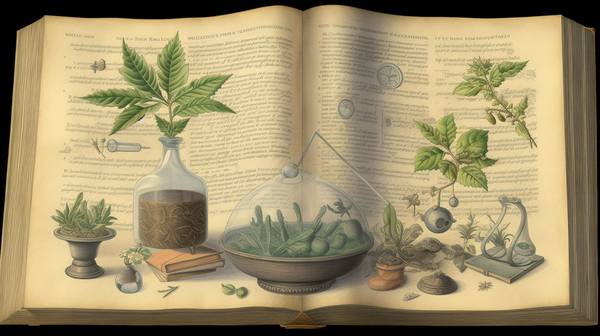"NAVIGATING TEEN CANNABIS USE: MENTAL HEALTH INSIGHTS FOR 2024"
Introduction
In the realm of adolescent health and well-being, the discourse around cannabis usage presents a complex tapestry of facts, myths, and ongoing research.
As we step into 2024, the conversation around teen cannabis use has never been more critical, especially in the context of mental health. This introductory section delves into the nuanced dynamics of adolescent cannabis consumption, shedding light on the psychological impacts and the pivotal role of informed guidance in navigating these waters.
With a focus on understanding rather than judgment, this article aims to unravel the complexities of teenage cannabis use, providing parents, educators, and mental health professionals with the insights needed to support our youth in making informed decisions.
As we embark on this journey, our goal is to foster a dialogue that is both empathetic and educational, ensuring a well-rounded perspective on this pressing issue. As we delve into 2024, it's imperative to arm ourselves with the most current and comprehensive understanding of how cannabis interacts with teen mental health.
This guide aims to shed light on this intricate subject, providing parents, educators, and policymakers with the knowledge needed to navigate these waters effectively.
Understanding Cannabis: A Primer
Cannabis, known by many names including marijuana, weed, and pot, is a psychoactive plant that has been at the center of medical, legal, and social debates for decades. Its effects on the human body are mediated through the endocannabinoid system, with THC (tetrahydrocannabinol) being the primary compound responsible for its psychoactive properties.
The Impact on Adolescent Brains
The adolescent brain, a marvel of developmental complexity, is particularly susceptible to external influences. Research suggests that the psychoactive components of cannabis can interfere with the natural trajectory of brain development in teens, potentially leading to:
- Altered brain structure and function
- Impairments in cognitive abilities
- Increased risk of psychiatric disorders
Mental Health Correlations
The relationship between cannabis use and mental health in teens is multifaceted, with studies pointing to both potential therapeutic benefits and risks. Key mental health concerns associated with teen cannabis use include:
- Anxiety and Depression
- Psychosis and Schizophrenia
- Substance Use Disorders
 Analyzing the Data: What the Latest Research Says
Analyzing the Data: What the Latest Research Says
Recent studies have provided new insights into the nuances of how cannabis affects teen mental health. A comprehensive analysis of the data reveals several critical findings:
- Dose-Response Relationship: The impact of cannabis on mental health appears to be influenced by the amount and frequency of use.
- Individual Susceptibility: Genetic, environmental, and psychological factors play a significant role in determining the risk of adverse mental health outcomes.
- Contextual Factors: The legal and social environment surrounding cannabis use can significantly impact its effects on teens.
The Role of Cannabidiol (CBD)
Cannabidiol (CBD), a non-psychoactive compound found in cannabis, has garnered attention for its potential therapeutic effects. Research into CBD's impact on mental health is ongoing, with some studies suggesting it may offer benefits for anxiety and mood disorders.
Navigating the Legal Landscape
The legal status of cannabis varies widely across the globe, with a growing number of regions decriminalizing or legalizing its use for medicinal and recreational purposes. This shifting legal landscape has implications for access, education, and public health strategies.
The Importance of Education and Prevention
In light of the evolving understanding of cannabis and its effects on teen mental health, education and prevention emerge as critical components of a comprehensive public health approach. Key strategies include:
- Informing Teens and Families: Providing accurate and age-appropriate information about the risks and potential benefits of cannabis use.
- Supporting Schools and Communities: Implementing evidence-based programs that promote mental health and prevent substance abuse.
- Advocating for Policy and Research: Supporting policies that protect teens and funding research to fill gaps in our understanding.
Best Practices for Parents and Educators
Parents and educators play a pivotal role in guiding teens through the challenges and choices related to cannabis use. Best practices include:
- Open and Honest Communication: Encouraging dialogue about cannabis and its effects on health and well-being.
- Setting Clear Expectations: Establishing and enforcing rules about substance use based on informed understanding and family values.
- Providing Support and Resources: Offering guidance and access to professional help for teens struggling with substance use or mental health issues.
Conclusion
As we navigate the complexities of cannabis and teen mental health in 2024, it's clear that a multifaceted approach grounded in the latest research and best practices is essential.
As we conclude our exploration of teenage cannabis use and its implications on mental health in 2024, it's clear that this topic demands our vigilant attention and empathy. Navigating the complex landscape of adolescent development, influenced by cannabis, requires a balanced approach that combines informed awareness, open communication, and supportive strategies tailored to individual needs.
By fostering environments where teens feel understood and guided rather than judged, we pave the way for healthier choices and resilient futures. The insights shared in this discussion aim to equip caregivers, educators, and mental health professionals with the knowledge to effectively support the youth in this evolving conversation. Embracing these challenges with compassion and informed action will undoubtedly contribute to the well-being of our young generation as they journey through these pivotal years.
By fostering an environment of open communication, education, and support, we can empower teens to make informed decisions and promote their mental and physical well-being.
Frequently Asked Questions (FAQs)
-
Is cannabis safe for teenagers to use? The safety of cannabis for teenagers is contingent on various factors, including the amount and frequency of use, individual susceptibility, and the presence of other risk factors. While some teens may not experience significant adverse effects, others may be at increased risk for mental health issues and cognitive impairments.
-
Can CBD be used to treat mental health issues in teens? CBD has shown promise in some studies for treating anxiety and other mental health conditions. However, more research is needed to fully understand its efficacy and safety for teens.
-
What can parents do to prevent cannabis use in teens? Parents can play a crucial role by maintaining open lines of communication, setting clear expectations about substance use, and providing education about the risks and benefits of cannabis.
-
How does the legal status of cannabis affect its impact on teen mental health? The legal status of cannabis can influence its accessibility, perceptions of risk, and the quality and safety of the product. Legalization and regulation can also provide opportunities for education and harm reduction strategies.
-
By embracing an informed and proactive stance, we can navigate the challenges of cannabis use among teens with a balanced and evidence-based approach, ensuring their health and well-being remain at the forefront of our efforts.
--
"Unlock the secret to organized and stylish cannabis storage with our premium stash boxes - visit our website now to discover your perfect match!"
--









